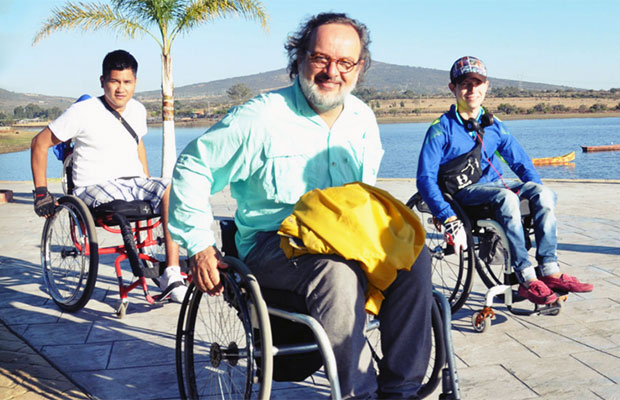
Don Bosco on Wheels: Extraordinary Abilities, Infinite Possibilities
In 2010, Father Jaime Reyes Ratana formed Don Bosco on Wheels — a modest undertaking with a mission to provide wheelchairs and social support to a small group of youth with disabilities in Guadalajara, Mexico. Little did he know how great the need was — or that his project would rapidly grow to become one of the country’s leading champions for those living with spinal cord injuries.
Despite protections afforded them by the United Nations Convention on the Rights of Persons with Disabilities, those with physical challenges in Mexico face significant barriers to full social inclusion. With few accommodations in transportation, public services, building access and more, many are forgotten and feel invisible to the rest of the world. This is especially true for children whose parents lack the knowledge, financial resources or outside support to assist their sons and daughters in achieving independence. In the case of spinal cord injuries, especially, a lack of specialized medical and rehabilitation facilities means that far too many children languish in bed — either at home or in the hospital — leaving their bodies, minds and spirits atrophied by neglect.
Initially, Don Bosco on Wheels sought to involve these children in existing Salesian-run projects in Guadalajara. The plan was to bring them out of isolation and into a social environment where they could play, learn and connect both with their able-bodied and disabled peers. But after witnessing first-hand how many challenges such youth still faced, Fr. Jaime and his staff resolved to expand the program to address broader, longer-term goals.
“So many people still don’t understand that children with disabilities can enrich society with their own unique gifts and perspectives,” says Aldo Chavarria, co-founder and director of Don Bosco on Wheels. “They do not want, or need, pity — yet far too often this is what they receive. And this pity limits the children’s potential and their own appreciation for what they can offer.
“Our mission therefore focuses on de-victimizing youth with disabilities; helping them develop their self-esteem; and educating the public on how to celebrate them, not feel sorry for them,” he continues. “In this way, youth can begin to envision — and work toward — a future where they can live independently.”
As a case in point, the program’s official van is painted with the following words: “Here travel people with motor disabilities, but with extraordinary abilities too.” Partially due to such outreach (and significantly due to the passion and dedication of Fr. Jaime, Mr. Chavarria and other staff) Don Bosco on Wheels is now renowned throughout Mexico.
“Wherever Salesian missionaries have a presence in Mexico, we are known,” says Mr. Chavarria. “And those missionaries are invaluable in connecting children and adults in their geographical areas with us. Fr. Jaime will travel to meet with those interested in the program, and that’s how new participants become involved.”
Now with 16 locations across Mexico, the program is the country’s sole organization focused on supporting youth and adults with motor disabilities. It works diligently to connect them with needed equipment, medical supplies, job training and various social services. In just five short years, Don Bosco on Wheels has served more than 200 youth with disabilities and their families — though staff aspires to a much wider reach. In fact, at the invitation of government officials, Don Bosco on Wheels is evaluating the feasibility of establishing Mexico’s first comprehensive spinal cord injury center — one that would provide physical and psychological support, preventive health services and workforce training under one roof.
“It is true that we support disabled youth and their families,” says Mr. Chavarria. “But society as a whole benefits from our work as well. The infinite gifts and talents of our participants enrich us all.”
Be sure to stay connected for more inspirational stories and updates from Don Bosco on Wheels.
Our mission gives hope to people with disabilities. What’s your mission?

